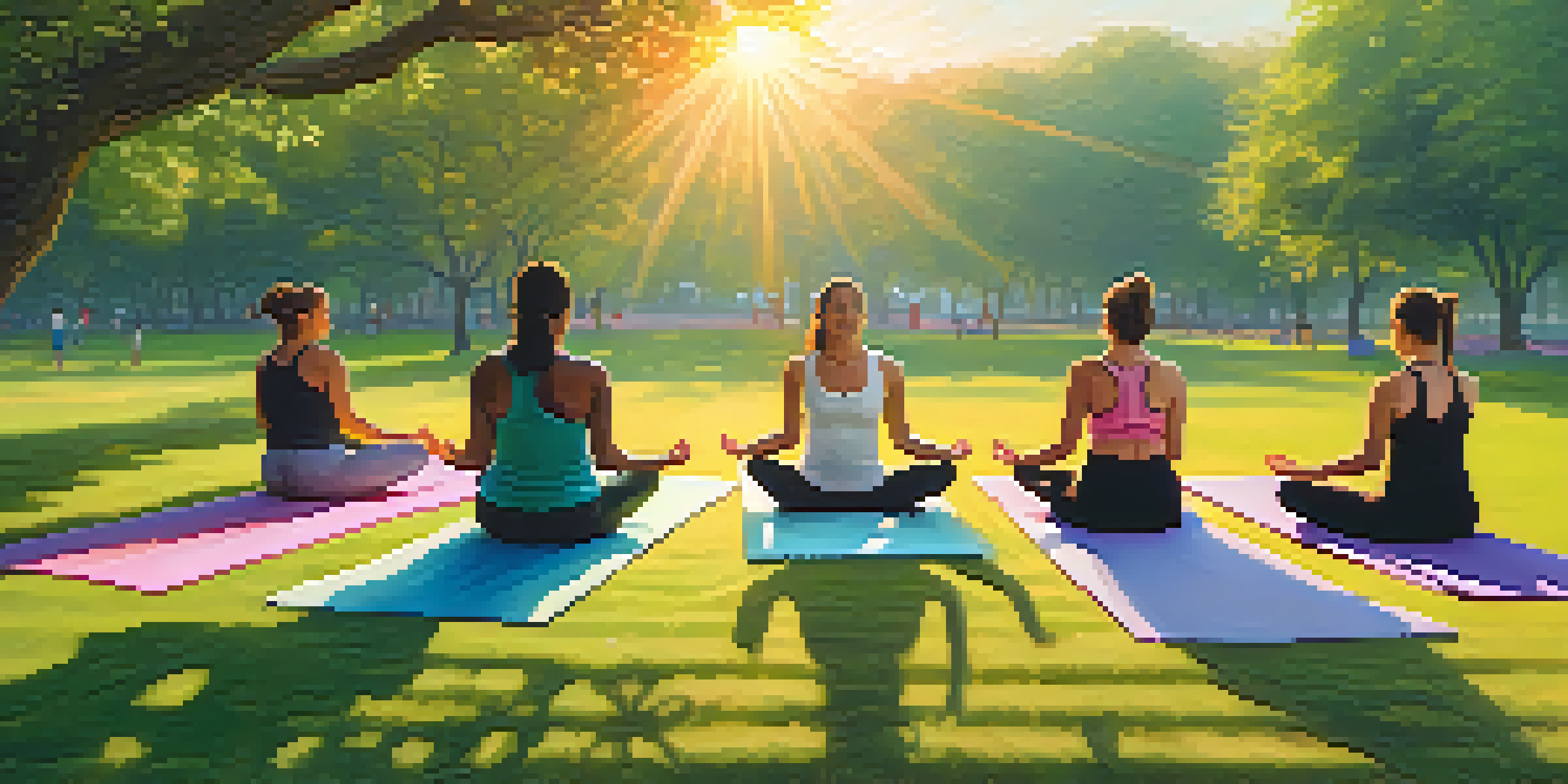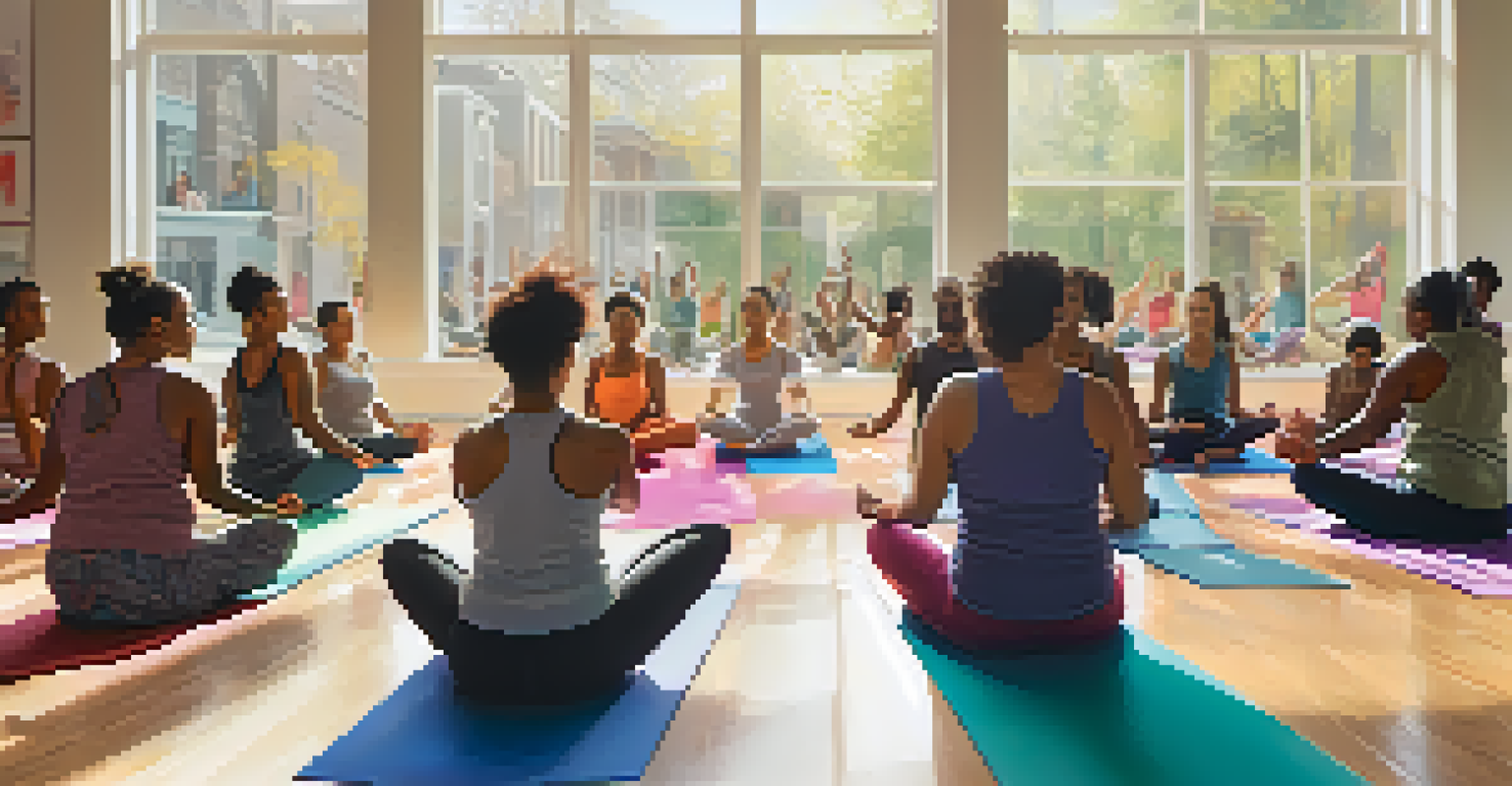Yoga for Social Change: Building Resilience in Activists

Understanding the Role of Yoga in Activism
Yoga is more than just a physical practice; it's a holistic approach to well-being. For activists, who often endure high levels of stress and emotional turmoil, yoga can serve as a sanctuary. It provides tools to cultivate mindfulness, helping practitioners stay grounded amid the chaos of social justice work.
Yoga is the journey of the self, through the self, to the self.
By incorporating yoga into their routines, activists can enhance their mental clarity and emotional stability. This is crucial when facing the challenges of advocating for change, which can be both exhausting and disheartening. Yoga encourages a deeper connection to oneself, promoting self-awareness and resilience.
Ultimately, yoga empowers activists by fostering a sense of community and shared purpose. Group practices can create bonds that strengthen collective efforts, reinforcing the idea that wellness is essential in the pursuit of social justice.
Building Emotional Resilience Through Mindfulness
Mindfulness, a core component of yoga, helps activists manage their emotions effectively. By focusing on the present moment, they can reduce anxiety and prevent burnout. This practice encourages individuals to acknowledge their feelings without becoming overwhelmed by them.

For example, during intense activism periods, taking a few moments to breathe deeply can reset an activist's emotional state. This simple act can transform stress into clarity, allowing for more strategic decision-making. Mindfulness teaches that it's okay to pause and reflect, which is vital in high-pressure situations.
Yoga Supports Activist Well-Being
Yoga provides activists with tools for mindfulness and emotional resilience, essential for sustaining their efforts in social justice.
Moreover, regular mindfulness practice can lead to a greater sense of compassion. Activists often fight for the rights of others, and cultivating empathy through mindfulness can enhance their understanding of the struggles faced by those they advocate for.
Physical Benefits of Yoga for Activists
The physical practice of yoga offers numerous benefits that directly support the work of activists. Stretching and strengthening the body can alleviate tension and prevent injuries caused by long hours of standing or marching. This physical resilience is essential for sustaining energy during demanding campaigns.
The greatest weapon against stress is our ability to choose one thought over another.
In addition, yoga enhances flexibility and balance, both physically and mentally. These qualities can help activists adapt to changing circumstances, whether in a protest or a strategy meeting. A healthy body often correlates with a healthy mind, creating a solid foundation for effective activism.
Furthermore, yoga encourages deep breathing, which improves lung capacity and overall vitality. This physiological boost translates to increased stamina, allowing activists to engage passionately in their work without feeling depleted.
Creating a Supportive Community Through Yoga
When activists come together in a yoga setting, they foster a sense of belonging and support. This community aspect is crucial for combating feelings of isolation that often accompany social justice work. Building a network of like-minded individuals can create bonds that uplift and motivate each other.
Group yoga sessions provide a safe space for sharing experiences and challenges faced in activism. Participants can exchange coping strategies, reinforcing the idea that they are not alone in their struggles. This collective support can be a powerful antidote to the loneliness that many activists experience.
Mindfulness Enhances Emotional Clarity
Practicing mindfulness through yoga helps activists manage stress and maintain focus, allowing for more strategic decision-making.
Additionally, yoga communities often emphasize inclusivity, welcoming individuals from diverse backgrounds. This diversity enriches the practice, allowing activists to learn from one another and broaden their perspectives on social issues.
Yoga Techniques for Stress Management
Activists can benefit from specific yoga techniques designed to manage stress effectively. Practices like restorative yoga focus on relaxation and rejuvenation, allowing participants to release tension built up over time. This can be especially beneficial after long days of advocacy work.
Breathwork, or pranayama, is another vital technique that helps regulate the nervous system. Deep, intentional breathing can calm anxiety and promote a sense of peace, which is essential for maintaining focus and clarity in activism. Integrating these techniques into daily routines can lead to lasting changes in how activists handle stress.
Moreover, guided meditations can help activists visualize their goals and intentions. Fostering a clear vision can enhance motivation and provide a sense of purpose, making the journey toward social change feel more attainable.
Incorporating Yoga into Activism Practices
Incorporating yoga into activism doesn't have to be complicated. Activists can start by setting aside just a few minutes each day for stretching or mindfulness exercises. Even short practices can make a significant difference in overall well-being and resilience.
Creating designated times for group yoga sessions at community events can also be impactful. These gatherings can serve as both a physical and mental recharge, helping participants connect with their bodies and each other. This integration of yoga into activism can enhance energy levels and reinforce community bonds.
Community Strengthens Activism
Group yoga sessions foster a supportive community among activists, combating feelings of isolation and enhancing collective motivation.
Additionally, activists can explore virtual yoga classes, making it accessible to those with busy schedules or limited mobility. The flexibility of online practices allows individuals to engage with yoga on their terms, ensuring everyone can benefit from this powerful tool.
The Lasting Impact of Yoga on Activism
The benefits of yoga extend far beyond the mat, leaving a lasting impact on activists and their communities. By cultivating resilience and well-being, yoga empowers individuals to face challenges with confidence and clarity. This positive energy can ripple out, inspiring others to join the movement for change.
Moreover, as activists prioritize their health and well-being, they set an example for others in the movement. Practicing self-care and resilience can shift the narrative around activism, demonstrating that caring for oneself is essential to effecting meaningful change. This paradigm shift can lead to a more sustainable approach to activism.

In essence, integrating yoga into activism not only benefits individual practitioners but also strengthens the entire movement. As more activists embrace these practices, they can create a culture of resilience, compassion, and support that ultimately drives social change forward.